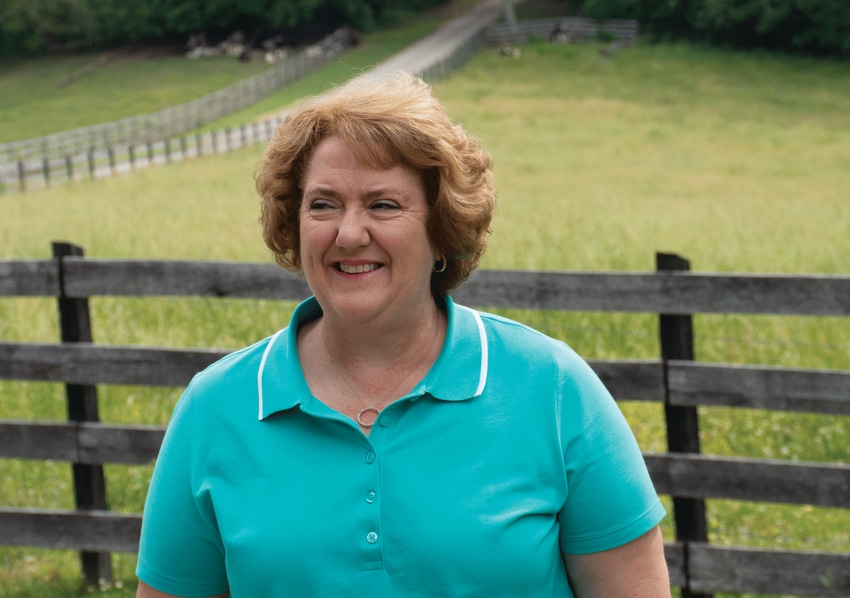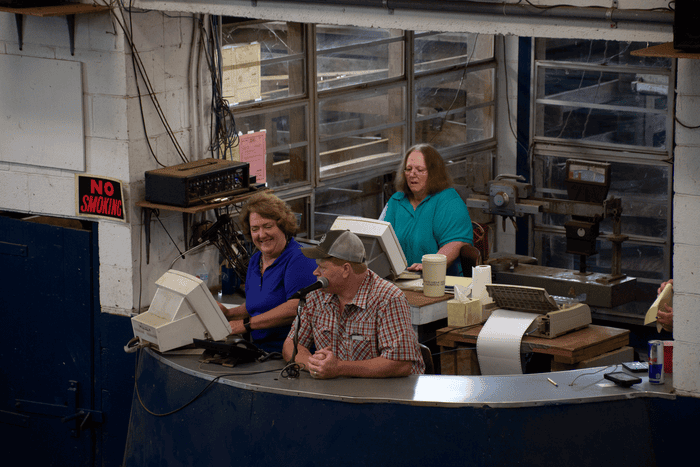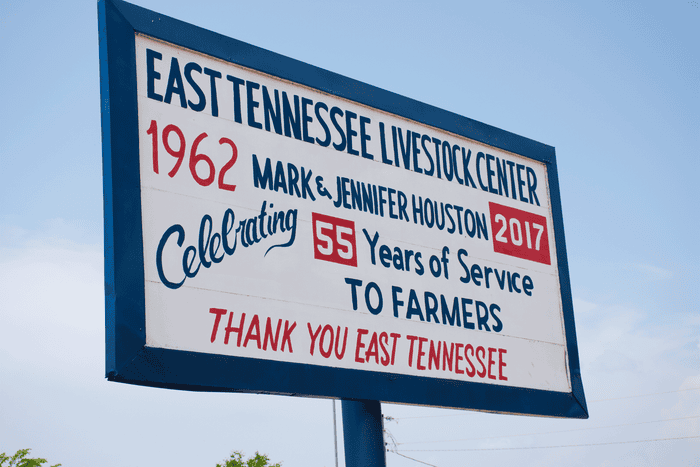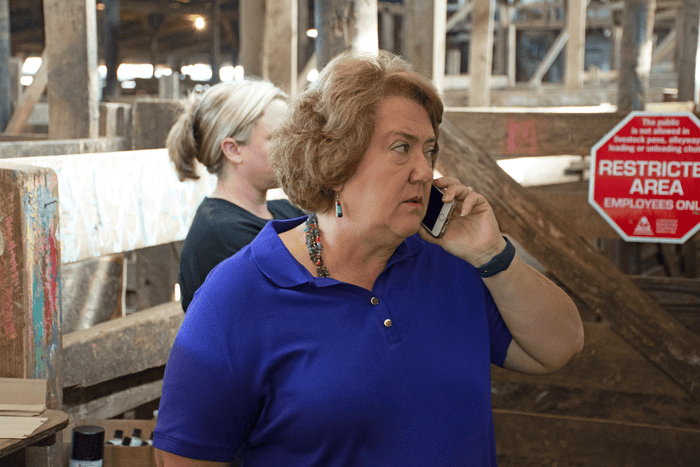For NCBA’s incoming president, it’s passion for the business and its people that motivates her.

It doesn’t take long, when talking to Jennifer Houston, to hear in her voice the passion she has for the beef business and the people involved in it. Indeed, for the incoming president of the National Cattlemen’s Beef Association (NCBA), her passion for the business and commitment to those who make a living from it has been, and continues to be, the driving force behind her remarkable list of industry involvement.
Maybe that’s because she was born into it. Maybe because it was further ignited when she married into it. Whatever the reason, everyone who raises cattle has benefited.

Although Jennifer Houston (left) travels extensively in her role as a member of the NCBA officer team, she manages to make it home to Sweetwater, Tenn., often enough to take her familiar spot on the auction block at the East Tennessee Livestock Center. She credits an outstanding staff for keeping things humming at home while she’s gone, however.
Houston grew up on a cattle and hog farm in west Tennessee and studied animal science at the University of Tennessee. That’s where she met her husband, Mark, whose family owns East Tennessee Livestock Center in Sweetwater.
After she and Mark married and Jennifer swapped ends of the state, she worked for USDA for several years until their first child, Virginia, came into their world. “So after Virginia was born, I didn’t go back to USDA. I came to the market full time,” she recalls.
And from that launch pad began a long career of involvement in the beef business.
The seeds were planted back on the farm, as she watched her father’s involvement. Her father was active in state politics, heading up Farmers for (Howard) Baker during the senator’s 1978 reelection campaign. And her dad served a stint at USDA, first working for the Agricultural Marketing Service and then as USDA director of governmental affairs for several years.
Tennessee volunteer
But it was after she moved to Sweetwater that she really came into her own as an industry volunteer. “Mark’s dad was a former secretary of what was then the Tennessee Livestock Association, as well as worked with University of Tennessee Extension.”
The Tennessee Livestock Association represented both cattle and hog producers. It eventually split, allowing beef producers to focus on their side of agriculture. She was active in the group, and when it split, helped form and became the second president of the Tennessee CattleWomen’s Association.
“That was also the time the third Beef Checkoff referendum was passed [which established the current $1-per-head checkoff]. Tennessee had not yet had a beef council before that. So we formed one in 1985-86. And because of my position with the CattleWomen, I was representing the cattlemen’s association on the Beef Industry Council,” Houston says.

For more than 55 years, the East Tennessee Livestock Center has been a critical marketing point for area farmers. It also served as the launch pad for Jennifer Houston’s lifelong involvement in helping make the beef business better.
At the same time, Mark’s dad, Joe, served on the first executive committee of the Cattlemen’s Beef Board. There, he helped decide some often-contentious issues as beef producers forged a self-help program for the beef business.
That, she says, is where her volunteerism in the beef business started.
“For several years, I represented Tennessee on the National Livestock and Meat Board and served as chair of several committees.” After the Meat Board and National Cattle Association merged to form the present National Cattlemen’s Beef Association, she continued chairing several committees, which led to a stint on the NCBA executive committee.
“But I was not able to go any further at that point because I had small children at home,” she says. So she set her volunteer spirit aside and focused her energy on her family and the livestock market.
But children grow and Virginia and the couple’s son, Ross, left home to start their own lives. The apple didn’t fall far from the tree, as the old saying goes, and Virginia now serves as director of governmental affairs for the American Seed Trade Association in Washington. “And our son, Ross, who is six years younger, is a first-year doctoral student at the University of Tennessee in biosystems engineering,” Houston says.
When Virginia and Ross left home for college, that unstuffable energy was again focused on the beef business. And it’s been unstoppable ever since.
Houston continued her involvement in the Beef Checkoff, a program she feels strongly about. She served on the board of the Federation of State Beef Councils, where she rose through the ranks to become chair. The Federation of State Beef Councils is a group that represents the state Beef Checkoff organizations at the national level.
But she also kept her hand in ag policy at the state level, and at the end of her time as chair of the federation, she turned her attention to the policy side, chairing the policy division of NCBA. That led to her nomination to the officer rotation for NCBA, where she served as vice president and president-elect.
Goals at NCBA
Houston credits the women who went before her for paving the way — JoAnn Smith, Jan Lyons and others. Now she’s ready to make her mark on the beef business.
But she doesn’t intend to do it alone.
“I’m very proud of the relationship we have with our states,” she says. “I think we continue to improve, so we really push that with the officer team — and the officers are really committed to building that state-national partnership, because I think that’s one of the strengths of NCBA.”
NCBA is in good shape, she says, and her intent is to build on that. “We are a grassroots organization. Our policies start many times at the county level with someone who has an idea or something they think NCBA needs to do.”
From there, an individual person’s input can rise to the state level, where it’s considered by fellow beef producers, and then on to the national level. “If it’s passed on up and everyone agrees that’s the direction we need to go, then that is the marching papers that our staff in D.C. take as they work with the White House, Congress and the regulatory agencies, or the direction we take if [it affects another aspect of NCBA’s representation of its membership],” Houston says.
She says the officer team thinks that process is important, “and I want to strengthen that.” As the officers travel around the country, Houston encourages them to really get to know folks and their concerns: “Both the good things and the bad things about NCBA, so we can continuously improve.”
As Houston looks at the issues staring down the beef business, she contends that producers are best served in a culture that’s united, not divided. “As I’ve traveled throughout the states, county associations and district meetings, state associations and even internationally, I’ve found one truth: There’s a lot more that unites us than divides us.”
Beef producers will never agree on all the issues, but there are many more issues they do agree on than they don’t, she says. “So let’s concentrate on what we do agree on and get things moving in that direction, rather than focusing on what we don’t agree on.”
Achieving that will be important. “We’re going to be talking about traceability, and what can that mean for the industry — and what does it need to mean? We’re going to be talking about antimicrobial resistance and how we fit into One Health [an initiative], which is people, animals and the environment.”
Then there’s sustainability. “To me, sustainability means continuous improvement, so it’s important that we work with organizations that sometimes we’re not as trustful of, whether it’s a retail, NGO [non-governmental organization] or civil society,” she says. “We get their viewpoints, and they represent a lot of our consumers. So it gives us some touch points we need to look for.”
Those are just a few of the issues that NCBA knows face producers. It seems there are always issues that strike from nowhere, meaning NCBA must be always prepared.
“We need to be thinking about ‘What do we need to be doing?’ We know we’re doing a good job, but we have to prove it — so when our enemies attack us, we have the research to back it up, whether it’s checkoff research on nutrition and cancer or how well we’re doing with life cycle assessments on sustainability and reducing our carbon footprint.”
Advice for others
There are a lot of issues facing beef producers, and sometimes it can seem that an individual doesn’t have much influence over how they are addressed and solved. But Houston rejects that idea, saying beef producers can have a lot of influence.
“I think the first thing is to be involved. Be involved at whatever level you can. If it’s only your county because of your time constraints, that’s fine. If it’s regionally, if it’s state, if it’s representing your state at the national level, your voice matters. Your voice won’t be heard if you’re not there.”

There are a couple of things a person in the NCBA officer rotation can expect — a lot of time traveling and a lot of time on the phone. And even if the call comes in during a sale, incoming NCBA President Jennifer Houston is available.
Houston says that far too often, when people disagree, they disengage. “To me, that’s the worst thing you can do. Voices matter. Voices mean people. And people are important when we talk to Congress, they’re important when we talk to the White House, they’re important when we talk to the government agencies.”
Houston says NCBA tries to do a good job for the entire beef business, “because we know we’re speaking for cattlemen, whether they’re a member or not.” So, she encourages all beef producers to be members at whatever level they can.
“Obviously, we’d love for you to be a NCBA member. But start at your county association, then your state, then NCBA. And do all of it so we’re a united front and a united voice and working in the same direction.”
It’s clear that Houston’s passion for the beef business and beef producers is what motivates her, but she knows she’s not alone. “I think we all — when you talk about beef producers across the nation — we all have a passion,” she says.
“I have a passion for the industry, for agriculture, and a really deep-seated belief that nobody is going to do it for us. Nobody has our interests in mind like we do.”
She says it’s a privilege to represent farmers and ranchers. “It’s something I try not to forget, that not everybody has the opportunity to do this.”
She’s thankful that she has a supportive husband and a great staff at the auction. It’s their support and hard work that allow her to invest the remarkable amount of time it takes to be a NCBA officer.
“But taking the time away is something I feel strongly about. If I can do it, let me do it. Maybe I’m helping someone who’s not able to do it right now.”
About the Author(s)
You May Also Like



